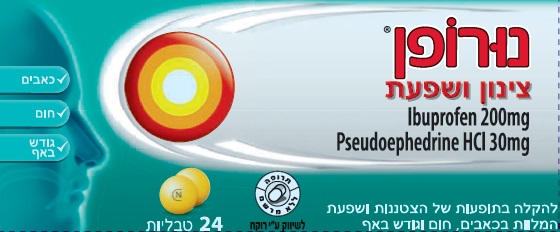Quest for the right Drug

נורופן צינון ושפעת NUROFEN COLD AND FLU (IBUPROFEN, PSEUDOEPHEDRINE HYDROCHLORIDE)
תרופה במרשם
תרופה בסל
נרקוטיקה
ציטוטוקסיקה
צורת מתן:
פומי : PER OS
צורת מינון:
טבליה : TABLETS
עלון לרופא
מינוניםPosology התוויות
Indications תופעות לוואי
Adverse reactions התוויות נגד
Contraindications אינטראקציות
Interactions מינון יתר
Overdose הריון/הנקה
Pregnancy & Lactation אוכלוסיות מיוחדות
Special populations תכונות פרמקולוגיות
Pharmacological properties מידע רוקחי
Pharmaceutical particulars אזהרת שימוש
Special Warning עלון לרופא
Physicians Leaflet
Adverse reactions : תופעות לוואי
4.8 Undesirable effects The most commonly observed adverse events are with ibuprofen are gastrointestinal in nature. The following list of adverse effects relates to those experienced with ibuprofen at OTC doses (maximum 1200mg per day) and sympathomimetics including pseudoephedrine for short-term use. In the treatment of chronic conditions, under long-term treatment, additional adverse effects may occur. Adverse events which have been associated with Ibuprofen and sympathomimetics including pseudoephedrine are given below, listed by system organ class and frequency. Frequencies are defined as: Very common (≥1/10), Common (≥1/100 and <1/10), Uncommon (≥1/1000 and <1/100), Rare (≥1/10,000 and <1/1000), Very rare (< 1/10,000) and Not known (cannot be estimated from the available data). Within each frequency grouping, adverse events are presented in order of decreasing seriousness. System Organ Class Frequency Adverse Event Blood and Lymphatic Very rare Haematopoietic disorders1 System Disorders Immune System Disorders Uncommon Hypersensitivity with urticaria and pruritus2 Very rare Severe hypersensitivity reactions including facial, tongue and throat swelling, dyspnoea, tachycardia, hypotension (anaphylaxis, angioedema or severe shock)2 Psychiatric Disorders Not known Insomnia, anxiety, restlessness, agitation, hallucination. Nervous System Disorders Uncommon Headache, tremor Very rare Aseptic meningitis3, muscular weakness Not known Posterior reversible encephalopathy syndrome (PRES) (see section 4.4) Reversible cerebral vasoconstriction syndrome (RCVS) (see section 4.4) Cardiac Disorders Not known Cardiac failure and oedema4, tachycardia, arrhythmia, palpitations. Not known Kounis Syndrome Vascular Disorders Not known Hypertension4 Respiratory, Thoracic and Not known Respiratory tract reactivity including Mediastinal Disorders exacerbation of asthma, bronchospasm or dyspnoea2. Gastrointestinal Disorders Uncommon Abdominal pain, nausea and dyspepsia5 Rare Diarrhoea, flatulence, constipation and vomiting Very rare Peptic ulcers, gastrointestinal perforation or gastrointestinal haemorrhage, melaena, haematemesis6. Mouth ulceration and gastritis. Not known Dry mouth, exacerbation of colitis and Crohn's disease7, ischaemic colitis. Hepatobiliary Disorders Very rare Liver disorders Skin and Subcutaneous Not known Hyperhidrosis Tissue Disorders Drug reaction with eosinophilia and systemic symptoms (DRESS syndrome) Severe skin reactions, including acute generalized exanthematous pustulosis (AGEP) Photosensitivity reactions Uncommon Skin rashes2 Very rare Severe cutaneous adverse reactions (SCARs), including Stevens- Johnson syndrome, erythema multiforme, exfoliative dermatitis and toxic epidermal necrolysis2 Musculoskeletal and Not known Muscular weakness connective tissue disorders Metabolism and Nutrition Not known Decreased Appetite Disorders Not known Hypokalaemia9 Renal and Urinary Very rare Acute renal failure8 Disorders Not known Urinary retention Not known Ureteric colic, dysuria Not known Renal tubular acidosis9 General and Not known Chest pain, irritability, thirst, Administration Site Conditions Investigations Very rare Haemoglobin decreased Eye disorders Not known Ischaemic optic neuropathy Description of Selected Adverse Reactions: 1 Examples include anaemia, leucopenia, thrombocytopenia, pancytopenia and agranulocytosis. First signs are fever, sore throat, superficial mouth ulcers, flu- like symptoms, severe exhaustion, unexplained bleeding and bruising. 2 Hypersensitivity reactions: These may consist of (a) non-specific allergic reaction and anaphylaxis, (b) respiratory tract reactivity including asthma, aggravated asthma, bronchospasm and dyspnoea, or (c) various skin reactions, including pruritis, urticaria, purpura, angioedema and, more rarely, severe forms of skin reactions such as exfoliative and bullous dermatoses (including toxic epidermal necrolysis can occur, Stevens-Johnson Syndrome and erythema multiforme). 3 The pathogenic mechanism of drug-induced aseptic meningitis is not fully understood. However, the available data suggest that NSAID- related meningitis develops in individuals rendered susceptible by an underlying autoimmune disorder who were previously sensitized or had a natural immunity to the drug. Of note, single cases of symptoms of aseptic meningitis (such as stiff neck, headache, nausea, vomiting, fever or disorientation) have been observed during treatment with Ibuprofen in patients with existing auto- immune disorders (such as systemic lupus erythematosus and mixed connective tissue disease). 4 Clinical trial and epidemiological data suggest that use of ibuprofen (particularly at high doses 2400mg daily) and in long-term treatment may be associated with a small increased risk of arterial thrombotic events (for example myocardial infarction or stroke), (see section 4.4). 5 The adverse events observed most often are gastrointestinal in nature. 6 Sometimes fatal, particularly in elderly. 7 See section 4.4. 8 Especially in long-term use, associated with increased serum urea and oedema. Also includes papillary necrosis. 9 Renal tubular acidosis and hypokalaemia have been reported in the post-marketing setting typically following prolonged use of the ibuprofen component at higher than recommended doses Reporting of Suspected Adverse Reactions Reporting suspected adverse reactions after authorisation of the medicinal product is important. It allows continued monitoring of the benefit/risk balance of the medicinal product. any suspected adverse events should be reported to the Ministry of Health according to the National Regulation by using an online form https://sideeffects.health.gov.il

שימוש לפי פנקס קופ''ח כללית 1994
לא צוין
תאריך הכללה מקורי בסל
לא צוין
הגבלות
לא צוין
מידע נוסף
עלון מידע לצרכן
07.07.20 - עלון לצרכן אנגלית 12.01.21 - עלון לצרכן עברית 07.07.20 - עלון לצרכן ערבית 26.02.23 - עלון לצרכן אנגלית 26.02.23 - עלון לצרכן עברית 26.02.23 - עלון לצרכן ערבית 15.11.23 - עלון לצרכן עברית 31.05.24 - עלון לצרכן אנגלית 31.05.24 - עלון לצרכן עברית 21.05.24 - עלון לצרכן ערבית 20.08.24 - עלון לצרכן עברית 07.07.20 - החמרה לעלון 12.01.21 - החמרה לעלון 29.03.24 - החמרה לעלוןלתרופה במאגר משרד הבריאות
נורופן צינון ושפעת